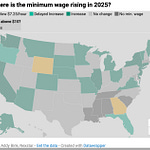“The ultimate test of man's conscience may be his willingness to sacrifice something today for future generations whose words of thanks will not be heard.”
—Gaylord Nelson (1916-2005), former governor of Wisconsin, founder of Earth Day
“Conscience” and “sacrifice” are two concepts that have long seemed in short supply, at least from businesses. It’s not hard to understand why, though, because the bottom line is always money. And more money. And as much short-term profit that a company can extract with the least outlay of, you guessed it, money. On the other hand, think of the real sacrifices that low-wage, front-line workers, like grocery store clerks and health care employees have made over the last 18 plus months—they have sacrificed with their lives, and some gambled with their lives, betting against contracting a deadly virus to keep their jobs and their paychecks. And too many lost that bet.
But companies that are subject to environmental regulation are especially obscene when it comes to avoiding a conscience or even minimal sacrifice for the good of the planet and future generations.
I can’t explain why, maybe it was rooted in my love for animals, or that I came of age in the 1970’s at the birth of our country’s environmental movement, that I felt a calling to “protect the environment”. And I chose law school to achieve that aim. I interned at the Ohio Environmental Protection Agency while in law school and landed a job there as a staff attorney, where I stayed for nearly 15 years. I wish I could say that I helped to “protect” the environment all that time, but that is not what happened or how I felt after several changes of our state’s administrators. I still have many close friends from my OEPA days, and know how much they cared about saving our land, water and air (and protecting the people who live on that land and drink that water and breath that air) from pollution, and they did their part. But it was startlingly clear whether a new governor, new director of the agency, new head of the legal department and a new Attorney General cared about enforcing state environmental laws, and everyone, including the businesses who did the polluting, knew it.
But let’s return to the glorious 70’s for some background on our first environmental laws. We have President Nixon to thank for the National Environmental Policy Act, otherwise known as NEPA, which he signed into law on January 1, 1970. It was our nation’s first federal environmental law that set the stage for all the others. It established the Council on Environmental Quality (CEQ) and required federal agencies to access the environmental impact of projects through a report conveniently called an “Environmental Impact Statement” or (EIS). As you might have noticed, NEPA also set the stage for a slew of acronyms to easily prevent anyone from even attempting to understand environmental laws.
Later in 1970, the Environmental Protection Agency was established, “which consolidated environmental programs from other agencies into a single entity.” And then each state was required to have their own version of an EPA and adopt state statutes and regulations that were at least as strict as the federal laws.
Throughout the 1970’s and early 1980’s, Congress passed laws specific to regulating water pollution, air pollution, hazardous waste, including what became known as Superfund sites, and where all our non-recyclables still go—solid waste landfills. As a charming aside, I was affectionately known as the Ohio EPA’s “garbage attorney” for a few years…oh, the good ole’ days!
It’s important to understand that before these environmental laws, our land, air and water were a free-for-all, dumping ground for pollutants of every kind. This environmental summary from ABC News touches on just some of the environmental catastrophes that were recorded in the 1950’s and 1960’s, and the initial laws that followed to rally concerted environmental action. Note that as one of his first acts as President, Lyndon Johnson signed the original Clean Air Act in December 1963.
But let’s return to how companies finagle their way out of complying with environmental laws. First, they fight every statute and regulation, through lobbyists on Capital Hill and in every state capital in the country. The lobbyists and company CEO’s not only fight statutes and regulations being enacted in the first place, they donate big bucks to candidates who they believe will be susceptible to their campaign or PAC donations, in an attempt to forestall even more strict regulations. I detailed these shenanigans in a prior post concerning the infrastructure bill negotiations.
Then to continue its fight against compliance, companies hire high-priced attorneys to parse every word of the regulations impacting their client. Let me give you just one example from my work involving hazardous waste law: Companies use lots of hazardous materials, like chemicals, in their production of products. But these chemicals are not regulated until they become “waste” after the production process. This waste is then discharged into the water, air and/or stored in onsite landfills through permits issued by state EPA’s The clever attorneys, forever looking for ways to spare their client a dime, would claim time and again that the deadly chemicals being stored on site in an unlined, dirt pit, for example, were not “waste” but stuff waiting to be re-used in the manufacturing process at some point in the distant future; therefore, it couldn’t be regulated and could continue to just sit there, usually vulnerable to the elements, and seep into the groundwater. Nope, nothing to be regulated here! Usually this argument didn’t hold up because the OEPA tested the material and made the company prove that it was still usable in their processes, but until that happened, it could just sit and rot and leak.
And finally, the turning point for my tenure at the OEPA, was when a new governor decided that our agency must refer to the regulated community, the polluters, as our “customers”. I was seething when in a staff meeting, I quipped, “Does that mean the customer is always right?” We were in charge of regulating these businesses and now they suddenly became our customers. And you can bet the companies and their attorneys jumped on this to become even more lax in their compliance, because they knew, courtesy of our wink and a nod, that we didn’t care.
This is the tone and attitude I’m referring to when I say that environmental laws matter and their strict enforcement matters even more. So what can you do to help prevent this evisceration of our environmental protection laws? At least, vote for only those candidates who have a proven track record of standing up for the environment and not business — who is in charge, matters. And attend as many local meetings hosted by your state’s EPA and environmental organizations as possible and comment for the record.
Stay tuned for an announcement of a question and answer thread on environmental issues to be posted soon!
As always,I’d love to know your thoughts because I’m writing to create a community who cares about these issues.
And please share with friends and family if you think they would enjoy.
If you are not already a free or paid subscriber, take the opportunity to join right now.
Additional Reading:















Share this post